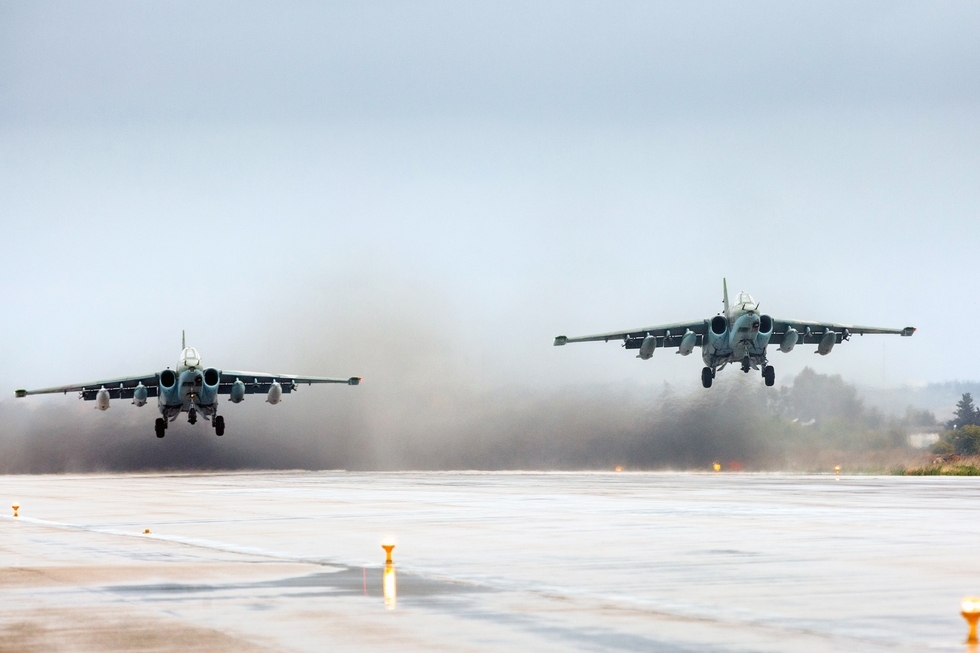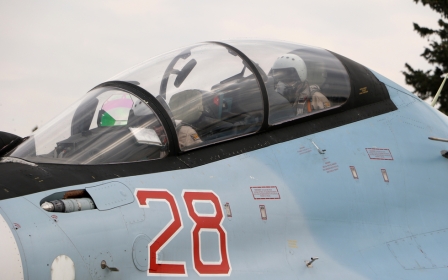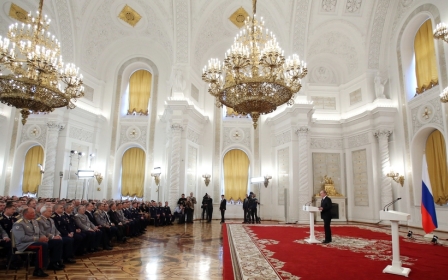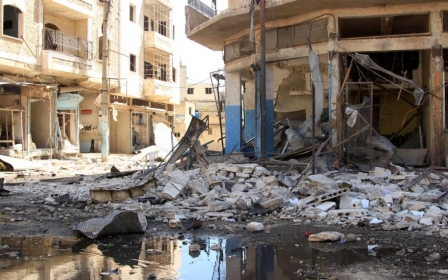Russia's six-month Syria campaign killed at least 1,100 civilians, say monitors

The Kremlin’s six-month campaign in Syria resulted in the deaths of more than 1,100 civilians, rights groups and monitoring organisations have said.
The Syrian Observatory of Human Rights reported this week that it has been able to confirm the deaths of 5,081 fighters and civilians as a result of Russia’s campaign, which started on September 30 2015 and lasted until March 2016.
Of the dead, 1,869 - or about 40 percent of the total numbers of people killed - were non-combatants, including 446 children and 278 women, the UK-based Observatory said. A further 1,586 were men not involved in the fighting.
The rest of the dead are believed to have been Islamic State group fighters and members of other armed groups such as the al-Qaeda affiliated al-Nusra Front.
"Perhaps these shocking statistics, cries and pain may move the conscience of this community to act for the immediate stopping of the ongoing murders against the Syrian citizens, and to bring the criminals to the specialised international courts, so they get their punishment," an Observatory statement said.
Russia's partial withdrawal of forces from Syria, which was announced on 15 March led to a drop of 70 percent, from 165 in February to 45 in March, in the number of events in which Russian forces were involved that resulted in civilian casualties.
The Russian campaign in Syria, however, is not totally over and air strikes are likely to continue.
The civilian death toll from Russia’s involvement during the first three months of its campaign alone was more than six times that attributable to the US-led coalition in the same period according to figures released by UK-based monitoring group Airwars.
In a report released in March, the British-based NGO placed the number of civilian deaths caused by Russian strikes from 30 September to 31 December at between 1,098 and 1,450.
The organisation investigated 330 incidents during that period in which Russian planes were thought to have been responsible for civilian casualties. Of those, the group managed to confirm 192 events.
The Russian Defense Ministry’s spokesman, Major General Igor Konashenkov, criticised the report as being “propaganda”.
“All these anti-Russian ‘experts’, ‘analysts’, ‘activists’, ‘human rights activists’, and simply those who hate Russia are growing up and proliferating like poisonous mushrooms in Britain,” he told journalists after Airwar's report was published.
“The absolute credulity and lack of criticism of some Russian business and economic media outlets, which are taking the works of the ‘British scientists’ seriously is …surprising.”
During the same three-month period, the US-led anti-Islamic State coalition was involved in 76 incidents of civilian casualties across Iraq and Syria, leading to a death toll of between 120 and 156, according to Airwars. The US has not acknowledged that any of these civilian deaths took place, which Airwars says undermines the coalition's criticisms of Russia.
“Protests by the US and allies at high civilian casualties from Russian airstrikes have been undermined by the Coalition’s own unwillingness to admit such casualties,” the report said. “Despite more than 11,000 Coalition airstrikes and credible estimates of over 1,000 civilians killed, only 21 such deaths have so far been admitted.”
The US policy is to count all adult males in areas of combat as fighters unless they can be proved to be otherwise.
Civilian infastructure hit
Airwars accounted for Russia’s higher death toll in part because of Moscow’s use of unguided weaponry, which needed to be packed with more explosives, which increased "collateral damage".
“However, evidence from the ground also points to Russia placing a far lower value on civilian lives in Syria during this period than the Coalition,” the report concluded.
Airwars researchers found that Russian air strikes targeted civilian infrastructure such as water plants, markets and bakeries and may have amounted to a deliberate effort to drive civilians out of rebel-held areas, something the Russian government denies.
The UK’s Foreign Secretary Phillip Hammond in January also accused Russia of targeting civilian infrastructure.
“The Russians are deliberately attacking civilians, and the evidence points to them deliberately attacking schools and hospitals and deliberately targeting rescue workers.
“If you go back for a second strike you know what you are doing.”
An Amnesty International report published last year also accused Russia of war crimes over its roll in civilian deaths.
“Some Russian air strikes appear to have directly attacked civilians or civilian objects by striking residential areas with no evident military target and even medical facilities, resulting in deaths and injuries to civilians. Such attacks may amount to war crimes,” said Philip Luther, director of the Middle East and North Africa Programme at Amnesty International.
Russia has repeatedly denied causing civilian deaths or targeting anything other than IS.
In February 2016, Russian Prime Minister Dmitry Medvedev said there was "no evidence of our bombing civilians, even though everyone is accusing us of this".
Viktor Bondarenko, a Russian colonel-general, said on state radio that “not a single time did my pilots hit any 'no-go' sensitive targets such as schools, hospitals, mosques or holy sites".
New MEE newsletter: Jerusalem Dispatch
Sign up to get the latest insights and analysis on Israel-Palestine, alongside Turkey Unpacked and other MEE newsletters
Middle East Eye delivers independent and unrivalled coverage and analysis of the Middle East, North Africa and beyond. To learn more about republishing this content and the associated fees, please fill out this form. More about MEE can be found here.




